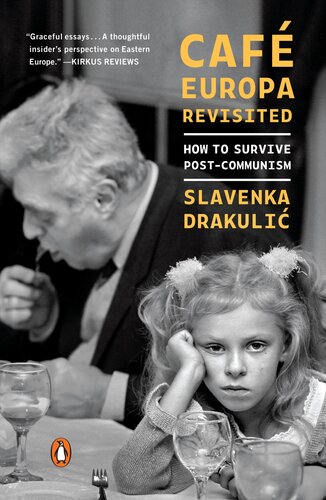
Café Europa Revisited
How to Survive Post-Communism
- اطلاعات
- نقد و بررسی
- دیدگاه کاربران
نقد و بررسی

October 15, 2020
A Croatian journalist and novelist reconsiders what's gone right--and wrong--in post-communist Eastern Europe. In this sequel to Caf� Europa (1997), Drakulic admits that Eastern Europeans had a "perhaps too rosy" view of the benefits of unity with the West and the ease of attaining it. Especially since the influx of immigrants in 2015 and 2016, questions of national identity have morphed into a virulent nationalism: "These sorts of ideas used to travel from west to east; now they are moving in the opposite direction, as if nationalization and Balkanization were no longer the property of Eastern Europe alone." The author often returns to points she's made before but generally gives them fresh life in these 15 graceful essays in which ordinary people and events tend to become metaphors for larger issues--e.g., the "fantastic" European health insurance card or the "ugly" revival of anti-Semitism on the continent. "European Food Apartheid" begins with EU and other investigations that found that food producers were sending subpar products to Poland, Bulgaria, and other former communist countries but opens out to suggest why Eastern bloc nations feel like "second-class consumers" in the EU. Another essay involves a widowed Serbian immigrant and much-admired shopkeeper in Stockholm whose only companion, a pet parrot, was confiscated by Swedish police when he failed to heed their warning to get a larger cage. The incident suggests why Balkan expatriates may feel like strange birds no matter how assimilated. In laying bare human emotions, Drakulic at times slights the larger political picture--in analyzing Viktor Orb�n's appeal to Hungarians, she fails to note that his government largely controls the media, which gives them a lopsided picture of him--but overall, she's a fine guide to many aspects of a region poorly understood by much of the West. A thoughtful insider's perspective on Eastern Europe's fitful steps toward democracy.
COPYRIGHT(2020) Kirkus Reviews, ALL RIGHTS RESERVED.

November 1, 2020
Croatian writer Drakulic (A Guided Tour through the Museum of Communism, 2011) examined the state of Europe in the years immediately following the 1989 fall of the USSR in her book Caf� Europa. Here, Drakulic returns to her study of life on the Continent as, 30 years post-fall, Europe is experiencing another series of upheavals. Though Eastern Europe is no longer walled off, its citizens still experience differences in daily life from their Western counterparts, even down to the specific recipe for Nutella sold in Slovakia versus Austria. With far-right nationalism emerging across Europe, Drakulic interrogates the meanings of citizenship and ethnicity. Massive migrant arrivals since 2015 have further affected waves of nationalism, as well as Germany's strength as a leader in the E.U. Drakulic analyzes collective memory and the need to maintain monuments to those lost in the Holocaust. When examining assimilation, she contrasts her experiences growing up in Yugoslavia with living in Sweden, as she does now. This far-ranging yet intimate work invites readers to consider contemporary European life in all its complexities.
COPYRIGHT(2020) Booklist, ALL RIGHTS RESERVED.




دیدگاه کاربران